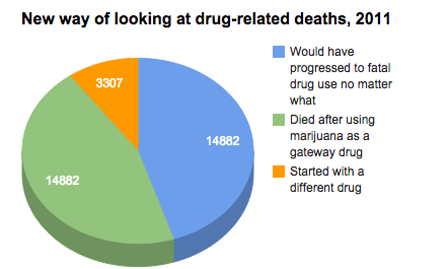Can You Die from Marijuana Use?

When marijuana is compared to other drugs, it’s often said that you can’t overdose on pot. It’s true that there are seldom direct deaths from using the drug. There are a couple of men in Germany who died when cannabis triggered heart complications. A woman in the UK died from a cardiac arrest triggered by marijuana toxicity. A French study stated, “Practitioners should be aware that cannabis may be a potential triggering factor for cardiovascular complications in young people,” but it stopped short of saying that marijuana caused these deaths.
So when marijuana deaths are listed, the cases above appear on the list along with a couple of deaths resulting from psychotic episodes triggered by potent doses. The point is then made about the relative harmlessness of this drug.
But there is a critically important point that is missed when calculating marijuana deaths. And that is the fact many people start their drug use with marijuana. It may not be able to be proved that marijuana use CAUSES a person to progress on to the use of other drugs, but it’s easy to show that pot use makes this transition much easier.
Consider these statements from a few people who completed rehab for addiction to heroin, cocaine, pills or other drugs:
Using marijuana opened the door to other drugs, other people, I stopped caring about life. I stopped going to school. I didn’t have goals anymore. I got introduced to heroin, cocaine. And I started using that.
Once I was smoking pot, I was around people who were doing other drugs. So it made it easier to just do those other drugs. I was, like, “Well. these people are doing it and they seem fine.” So I did it.
I started smoking marijuana so when I was with a group of people and they actually had Percocet, and they offered it to me and my thought process was like, “Well, I’ve smoked weed before, that’s a drug, this is another drug. So this is going to be fine. I’ll try that, it sounds fun.” And then it caught and spiraled downhill before I even realized what happened.
And then there is this quote from The Marijuana Policy Initiative:
“We now have support groups for parents of young addicts, called Learn to Cope, who tell us that over 90% of their addicted children began their journey into addiction to illicit drugs with potent 21st Century marijuana.”
“We now have support groups for parents of young addicts, called Learn to Cope, who tell us that over 90% of their addicted children began their journey into addiction to illicit drugs with potent 21st Century marijuana.” This is a very limited sample and this number may not stay true across a large sampling of parents whose kids become addicted. It does match our experience from January 2014, when we asked a dozen graduates about the start of their drug use. Each one either started with marijuana or pot and alcohol together.
So how could we calculate deaths from marijuana? Let’s look at three different ways we could calculate the fatal effects of marijuana.
- We could count just those people who died as a direct result of using the drug. Potent marijuana has been shown to interfere with the heart function and has been noted as the cause of death of at least three people.
- We could count those people who suffered panic attacks of psychotic episodes that caused them to take actions that resulted in their deaths. There were two of these deaths in a short time period in Colorado, shortly after recreational use of this drug became legal.
- Or we could also include those people for whom marijuana was a gateway to the use of harder drugs, who then died due to the use of drugs like heroin, cocaine, painkillers or combinations of drugs. If we do so, we are acknowledging that marijuana is a gateway drug and also, that in these cases, that gateway led straight to the person’s death.
When someone tries to say that marijuana is a gateway drug, he is usually shouted down by those claiming you can’t prove that marijuana causes the use of more dangerous and addictive drugs. On the other hand, it is pathetically easy to find evidence that use of marijuana makes it easier to progress to these other drugs. It lowers the barriers. Read the quotes above again and make your own decision.
Just for the sake of looking at way marijuana use might lead some people to injury or death, let’s use the third method of calculating marijuana deaths. Here are the numbers we would be working with.
- In 2011, drug overdose was the leading cause of injury death. The Centers for Disease Control and Prevention reported 33,071 unintentional drug overdose deaths that year.
- In this calculation, let’s use the 90% number stated by the parents of young addicts. So 10% started with some other drug than marijuana. We’re not saying that this is accurate across the whole population but let’s just see where this number leads us.
- Would it be safe to say that 1/2 of these people would never have used a fatal dose of heroin, cocaine, pills or a combination of drugs if they had not started with pot? For the sake of argument, let’s assume that half of these people would never have reached for the next drug had they not started with pot and the other half would have found their way to heroin, cocaine or other potentially fatal drugs anyway.
If we use these three factors in estimating how many people ultimately died as a result of the presence of marijuana in their lives, we end up with the deaths of 14,882 people.

This is not meant to be a scientific calculation. This is just food for thought for parents, educators, and others responsible for children.
This is just one way that the use of marijuana and the gateway theory should be considered before we discard these statistics. We are losing loved ones. If marijuana were considered to be a threat to one’s life—either on an immediate or an eventual basis—then perhaps we would not be so quick to accept its presence in our towns, schools, neighborhoods—and even our own homes.
References:


 ®
®